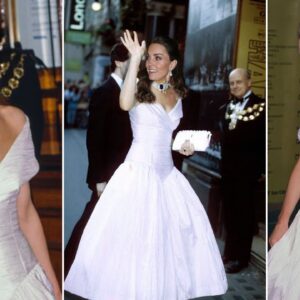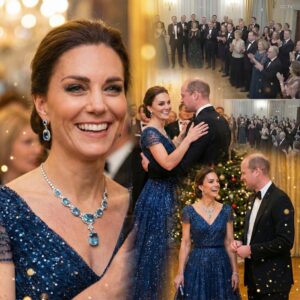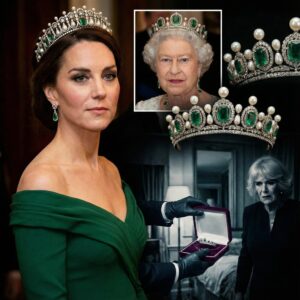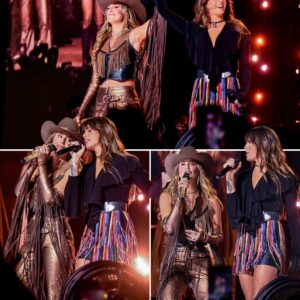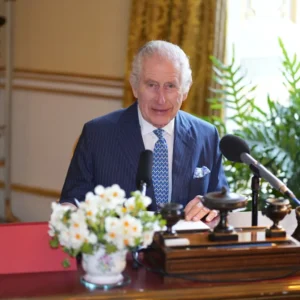The Highland mist clings to Craigh na Dun like a lover’s regret, those ancient standing stones humming with secrets older than the heather-strewn hills. In the flickering torchlight of 1714, Julia Beauchamp clutches her newborn son William to her chest, her heart thundering louder than the bees that swarm the fairy circle. Beside her, Henry—her Henry, the man who pulled her from the trenches of World War I’s carnage—grips her free hand, his face etched with the raw terror of a father who has already lost too much. Pursuers’ hooves thunder in the distance, Arch Bug’s vengeful shadow closing in like the Jacobite storms on the horizon. “Go!” Henry roars, thrusting Julia’s palm against the cold granite. The stones scream—a vortex of wind and wail—and then… nothing. Fade to black. Did she make it? Or is Claire Fraser’s mother lost to time, her fate a heartbreaking riddle that could unravel the very fabric of Outlander‘s multigenerational epic?
The Season 1 finale of Outlander: Blood of My Blood, titled “Something Borrowed,” aired on Starz just three weeks ago, and it’s left the fandom in a collective swoon of agony and ecstasy. Premiering August 8, 2025, this prequel spinoff—chronicling the star-crossed origins of Jamie Fraser’s parents Brian and Ellen, and Claire’s own Julia and Henry—has been a masterstroke of romantic torment, blending the lush, bodice-ripping allure of Diana Gabaldon’s novels with fresh twists that feel both inevitable and audacious. Episode 10 gut-punched us harder than Claire’s first touch of those cursed stones in 1743: Julia and Henry, finally reunited after a season of brutal separations, race to escape their 18th-century hell with baby William bundled in Julia’s arms. But as the buzzing intensifies and pursuers close in, doubt fractures their fragile hope. “What if the baby can’t travel?” Julia whispers, her voice a knife’s edge. Henry, ever the soldier, makes the call—shoving her toward eternity. Cut to the credits. No resolution. Just the echo of a family’s potential annihilation.
Showrunner Matthew B. Roberts, who helmed the original Outlander‘s emotional guttings like Jamie and Claire’s Print Shop reunion, knew exactly what he was doing. “We filmed five different endings,” Jeremy Irvine (Henry) revealed to ELLE post-finale, his voice laced with the same haunted intensity he brings to the screen. “Script rewrites on the spot—’Try it this way, now that.’ They had options in the edit, tailoring it to where Season 2 was headed.” Hermione Corfield (Julia), the luminous nurse whose 1920s grit mirrors Claire’s own, added fuel to the fire: “We’re on episode seven of Season 2 now, and I couldn’t tell you what’s next for Julia. It’s wild—heart-wrenching in ways that rewrite everything.” Filming, which kicked off in Scotland’s Wardpark Studios this summer, promises “dramatic twists” that could make even the staunchest Sassenach weep into their tartan. Late 2026 release? Fans are already spiraling, theory-crafting escapes that range from miraculous reunions to soul-shattering voids. Survival? Separation? Or a miracle that binds the prequel to Outlander‘s final bow in Season 8? Strap in—the cliffhanger chaos is just beginning. (And for a refresher on the devastation, stream the Season 1 finale here: Watch Season 1 Finale Here.)
To grasp the bone-deep ache of this moment, rewind to where it all fractured. Blood of My Blood—a title drawn from Gabaldon’s Dragonfly in Amber, where Jamie swears his heart’s blood to Claire—unfurls in dual timelines, 1715 for the fiery Scots Ellen (Harriet Slater) and Brian (Jamie Roy), and 1714 for the displaced English Julia and Henry. The Beauchamps’ tale kicks off in Episode 1 with a gut-wrench: Their sleek 1920s motorcar hurtles toward a misty circle of stones near Inverness. Claire, age 5, watches wide-eyed from the backseat as her parents vanish in a screech of tires and temporal thunder. Cut to the aftermath—a fiery crash, or so the world believes. But we know better. Gabaldon always hinted at time travel’s genetic curse; here, it’s weaponized into a love story forged in the Great War’s mud.
Julia, a VAD nurse with hands steady as steel (Corfield channels a pre-echo of Caitriona Balfe’s steely grace), meets Henry in a French field hospital, 1916. He’s shell-shocked, whispering of “voices in the wire” that aren’t artillery but something ancient, pulling him across centuries. Their whirlwind romance—stolen kisses amid mustard gas alerts—ends not in happily-ever-after but horror: A honeymoon drive to research Henry’s “Highland hum” obsessions catapults them to 1714. Separated on impact (echoing Claire’s own 1945 leap), Julia washes ashore pregnant and alone, captured by the ruthless Lord Lovat (Tony Curran, chewing scenery like it’s shortbread). Henry, battered and broken, falls into the Grant clan’s clutches, Arch Bug (Terence Rae) his tormentor-in-chief. Season 1 is their odyssey of survival: Julia bartering her wits for William’s safety in Lovat’s grim castle, Henry enduring torture while hallucinating Julia’s face in the flames. Their mid-season reunion in Episode 8—”a tease,” Roberts calls it—is electric: A hidden alcove tryst, hands trembling as they trace scars from wars across time. “You’re real,” Henry breathes. But it’s fleeting; separations claw them back.
By finale’s eve, the stakes are biblical. Julia, now Lady Lovat in a forced betrothal, stages her “kidnapping” with maid Davina’s help— a pulse-pounding sequence of feigned gratitude, a rock to Balloch’s skull, and a midnight gallop. Henry, escaped from the Grants, intercepts her at the stables, William’s wail their siren’s call. “We ride for the stones,” he vows, horse hooves pounding like war drums. Arch Bug pursues, a specter of vengeance; Lovat’s men fan out like wolves. Craigh na Dun looms—those monolithic sentinels, buzzing with the “song” that only travelers hear. No gemstone amulet (a rule from Outlander‘s lore, absent here for maximum peril). No blood vow like Ellen and Brian’s handfasting. Just raw desperation.
The scene unfolds in agonizing slow-motion: Julia cradles William, the infant eerily silent amid the stones’ roar. “He doesn’t hear it,” she realizes, dread pooling like ink. Time travel’s genetics are fickle—Brianna and Roger’s son Davy can’t traverse, per Gabaldon’s Go Tell the Bees That I Am Gone. What if William’s gene skipped? One parent must test with the babe; the other waits, risking recapture. Julia volunteers—”I’ve survived worse”—but Bug’s shadow crests the hill. Hooves thunder. Henry seizes her wrist: “Together. We try.” He slams her hand to the stone. The world warps—winds howl, bees swarm in a vortex of violet light. Julia’s scream mingles with William’s first cry. Screen cracks to static. Then, silence. Intercut with Ellen and Brian’s blood oath under fiery crosses signaling Jacobite rebellion, the episode ends on dual precipices: Duty versus desire, past versus future.
The fandom’s implosion was instantaneous. #BloodOfMyBloodFinale trended worldwide, racking 2.3 million mentions in 24 hours. TikTok erupted with edits syncing the stones’ buzz to Hozier’s “Take Me to Church,” fans lip-syncing Julia’s “What if?” amid tear-streaked filters. Reddit’s r/Outlander ballooned with 15,000-post threads: “Julia’s stranded—Henry and Will poofed to 1920s, leaving her to raise Claire’s ‘sibling’ in 1714!” screamed one top post. X (formerly Twitter) devolved into war: Team Survival (60% per a Variety poll) versus Team Separation (35%), with 5% wildcards betting on “miracle reunion via Master Raymond’s portals.” Gabaldon herself chimed in on her official forum: “The stones don’t give; they take. But love? That’s the real traveler.” (Cue collective swoon.)
Let’s theory-craft, Sassenachs. Theory One: The Shattering Separation. Most plausible, per lore. Julia and William fail to breach—Henry’s thrust too frantic, no gem to anchor. She awakens amid heather, babe in arms, pursuers upon her. Stranded in 1714, Julia becomes a ghost in the machine: Perhaps she infiltrates the Mackenzies as a healer, crossing paths with young Ellen (foreshadowing Claire’s Lallybroch arrival). William grows into Claire’s shadowy “brother,” the unnamed sibling Gabaldon teases in interviews. Fan favorite on Reddit: He’s the “Faith” Claire hears singing in Outlander Season 7’s finale—not her stillborn daughter, but a half-brother’s lullaby echoing through time. “Julia names him Faith—’faith we’ll reunite,'” posits u/Willing-Sample-7382. Heartbreak multiplier: Henry emerges alone in 1926, a “car crash survivor” raising phantom memories of a wife who birthed their son in tartan swaddling. He funnels grief into archaeology, unearthing stones that whisper Julia’s name. Connection to Outlander Season 8? The trailer’s offscreen voice—”Mrs. Fraser?”—could be grown-William, seeking his lost mother, tying prequel bows to Claire’s endgame.
Theory Two: The Void’s Cruel Jest. Darker, deliciously Outlander-esque. All three vanish into the “void”—that liminal scream-space between eras, where Geillis Duncan bartered souls. No reunion; just echoes. Julia’s riddle becomes Claire’s inheritance: Flash-forwards in Season 8 show Claire decoding her parents’ “crash” as a temporal trap, Master Raymond (the eternal alchemist) intervening with a gemstone ritual. Fans tie this to Jane and Fanny Pocock from Outlander Season 7—orphaned girls whose mother sang “I Do Like to Be Beside the Seaside,” a tune Julia hums in Episode 2. “Julia births Faith in the void, who time-slips to 1750s France, birthing Jane and Fanny,” theorizes a Woman’s World deep-dive. Incestuous ick? William weds Jane? Gabaldon nixed it in a 2023 con panel (“Too soap opera”), but the drama? Chef’s kiss. Survival odds: Slim, but the void’s void amplifies the “what if” that birthed the franchise.
Theory Three: The Miracle Reunion. Hope’s defiant roar. They all make it—stones mercy-granting for true love’s blood (William’s wail as unwitting sacrifice). But twisted: They land in 1919, pre-War, rewriting their meeting. Henry, unscathed, courts Julia anew; William vanishes into adoption, a “lost Beauchamp” whose gene sparks Claire’s 1945 leap. Or bolder: 2023 emergence, intersecting Outlander‘s modern arcs. “Julia plants forget-me-nots at the stones— the ones Claire finds,” per a viral TikTok (1.2M views). Reunion via Outlander Season 8 crossover: Claire, gem in hand, summons her parents at the Boston print shop equivalent—Craigh na Dun’s modern circle. Irvine teases to Radio Times: “Season 2 starts in a place I couldn’t fathom how we got there.” Corfield: “Fans will lose their minds.” Budget whispers from set spies? Epic battle sequences, temporal portals aglow. Miracle’s allure: It heals the franchise’s core wound—Claire’s orphan ache—while honoring Gabaldon’s “love conquers time” ethos.
These aren’t idle fancies; they’re the lifeblood of Outlander‘s cult. Gabaldon’s novels thrive on fanfic-fueled speculation—her forums birthed half the plot twists. Blood of My Blood amplifies it, dual timelines mirroring Claire/Jamie’s 20-year chasm. Brian and Ellen’s arc? A blood-vowed handfast under rebellion’s fiery crosses, Brian torn between Ellen’s bed and Jacobite duty. Ellen, the red-haired firebrand (Slater’s breakout, evoking a young Balfe), quips in Episode 9: “Ye think stones care for vows? They devour ’em.” Yet their finale oath—knives to palms, blood mingling like wine—mirrors Jamie’s to Claire, hinting parallels: Ellen births Jamie in hiding, as Julia might Claire’s kin.
Production pulses with promise. Filming in Scotland’s gloaming—Wardpark’s fog-shrouded sets, Glencoe’s wilds—Season 2 escalates. “Up a level,” Roy tells EW: “Wild stuff—battles, betrayals, budgets that’d make ye blush.” Slater: “Ellen faces choices that’d break lesser women.” Returning: Rory Alexander’s Murtagh (prequel pup to Duncan Lacroix’s grizzled icon), Séamus McLean Ross’s Colum. New blood? Rumors swirl of a “time-lost oracle” (echoing Raymond) and a “20th-century interloper.” Roberts, juggling Outlander Season 8’s wrap, vows integration: “Prequel plants seeds; main series reaps.” That Season 8 trailer voice? “Not spoiling,” he grins to TVLine, “but family trees twist like Highland roads.”
For the cast, it’s personal. Irvine, channeling Henry’s PTSD with veteran’s precision (his grandad’s war diaries informed the role), confesses to Primetimer: “Filming that thrust? Broke me. Jeremy’s a dad; imagining losing my boy…” Corfield, cradling prop-William (a eerily lifelike bundle), tears up: “Julia’s not just surviving—she’s fighting for a future we glimpse in Claire. That scream? Mine.” Their chemistry—WWI glances to 1714 grapples—mirrors Heughan/Balfe’s alchemy, birthing fan edits of “Beauchamp parallels” (5M YouTube views).
As October’s chill bites Edinburgh’s cobbles, Blood of My Blood‘s riddle haunts. Did Julia breach the void, stranding Henry in 1714’s brutal embrace? Or did the stones, capricious as Highland fate, grant a fractured mercy? Fans spiral, petitions for “reunion now” hitting 50K signatures. Gabaldon tweets cryptically: “Time’s a thief, but love? A greater one.” Season 2’s “heart-wrenching” teases—leaked set pics of Corfield in 1920s flapper garb, Irvine bloodied in kilts—hint at cross-era chaos. Survival means sacrifice; separation, rebirth; reunion, redemption.
In Outlander‘s tapestry, no thread frays alone. Julia’s leap isn’t just a mother’s desperation—it’s Claire’s origin, Jamie’s echo, a family’s blood singing through stones. The void beckons, but so does dawn. Will they emerge whole, or as ghosts in their daughter’s dreams? The buzz grows. Listen close, Sassenachs. The stones are whispering.
